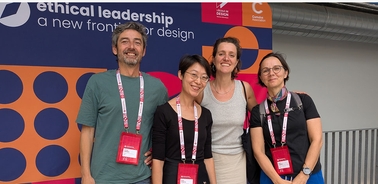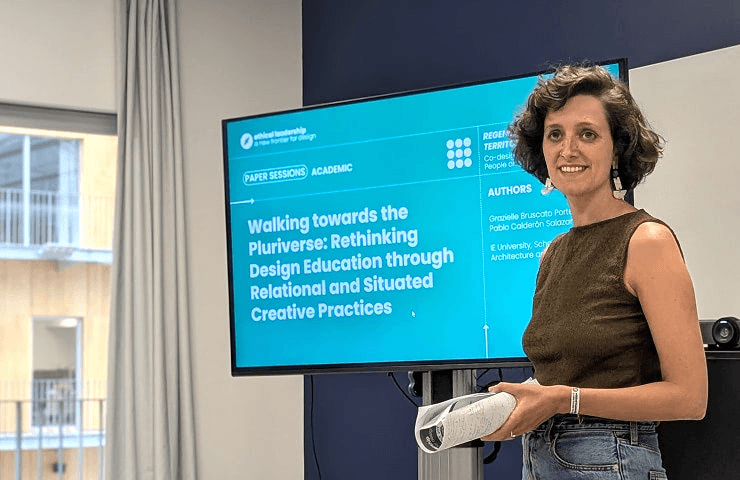Designing with Purpose: IE School of Architecture and Design at the Cumulus Conference 2025 in Nantes

IE University experts explored regenerative, ethics-driven design education and what it means to design for equity and the future.
IE School of Architecture and Design took part in the 2025 Cumulus Conference, recently held in Nantes, France, under the theme Ethical Leadership: A New Frontier for Design. The event gathered over 500 participants from more than 70 countries to reflect on how design education can address challenges related to equity, regeneration, and responsibility.
As part of the Cumulus Association, the world’s leading international network for art and design education, research, and practice, experts from IE School of Architecture and Design joined the global dialogue on how to shape a more inclusive, just, and future-oriented design education. The conference also marked the launch of the "Cumulus Design Declaration 2025", which outlines a shared commitment to inclusive, regenerative, and care-centered design education.
"The Cumulus Design Declaration 2025 emphasizes the importance of moving beyond traditional notions of sustainability to systemic change, supporting design practices that are both globally aware and locally grounded."
Clara Llamas, Academic Director of the Bachelor in Design and Bachelor in Design and Business programs at IE School of Architecture and Design
It laid out five commitments:
- Planetary Health: Putting ecological regeneration at the heart of design.
- Equity and Inclusion: Advancing radical inclusivity rooted in solidarity and social justice.
- Ethical Leadership: Training designers to question and transform, not just execute.
- Relationality: Embracing interdependence among people, communities, and ecosystems.
- Hope and Imagination: Using speculative design to envision alternative futures.
These are not abstract ideals. They mirror the DNA of our programs at IE School of Architecture and Design, as we’ve embedded these values structurally–from studio formats to collaborative partnerships to curriculum design.
AI tools and environmental challenges
At the conference, IE University Professor Grazielle Bruscato Portella presented a paper, co-authored with fellow Design faculty, Pablo Calderón Salazar, titled “Walking towards the Pluriverse: Rethinking Design Education through Relational and Situated Creative Practices.” The paper advocates for design practices grounded in local context and relational accountability.

Their case study, a workshop held in Collserola Natural Park, invited students to explore climate uncertainty through embodied and speculative methods. Using walking, sensory mapping, AI tools like DALL-E, and speculative design, the workshop encouraged students to engage with environmental challenges in ways that move beyond human-centered frameworks. It exemplifies a hands-on, reflective, and politically engaged pedagogy.
Beyond this contribution, the conference offered a broad spectrum of critical insights. Sessions ranged from regenerative studios working in endangered ecosystems, to critical reflections on project-based education, to embedding ethics frameworks in visual design. One standout moment came from design management scholar Brigitte Borja de Mozota, who asked a pointed question: "Why hasn’t the value of design been universally embraced yet?"
From declaration to action
One question echoed throughout the conference: "How do we move from declaration to action?" The "Cumulus Design Declaration 2025” outlines a powerful vision, but its impact depends on how we translate its principles into everyday academic and design practice.
As Academic Director of the Bachelor in Design and Bachelor in Design and Business, I left Nantes with both clarity and urgency: we are no longer tweaking outdated systems, but actively redesigning the ways we live, learn and lead. Here’s what that means to our School:
- Nurturing the curriculum with future-forward and locally grounded practices, to thoughtfully bring the change we want to see in the world.
- Embedding pedagogies with a strong social-grounding that are life-centered and systems-aware.
- Advancing values-based learning by deepening our engagement with design ethics, decolonial thinking, and ecological mindsets.
Cumulus Nantes 2025 made clear that design education cannot remain neutral, it must take a stand and act. At IE School of Architecture and Design, we are committed to regeneration, plurality, and ethics in action. We return to Madrid ready to apply what we’ve learned: integrating new pedagogical tools, fostering richer dialogues in our classrooms, and pushing our students and ourselves to design with justice and beauty at the core.
—
This article was written by Clara Llamas, Academic Director of the Bachelor in Design and Bachelor in Design and Business programs at IE University's School of Architecture and Design in Madrid. She has over 20 years of experience in service design, strategic consultancy, and organizational transformation across multiple sectors. Llamas has held leadership roles at Livework Studio and Veriteer in UK and founded Alambique in Finland. She holds a BSc in Cultural Anthropology from NYU and an MA in Service Design from the University of the Arts London. Currently pursuing a PhD, her research focuses on how kinship studies can improve and expand the impact of service design in organizations.